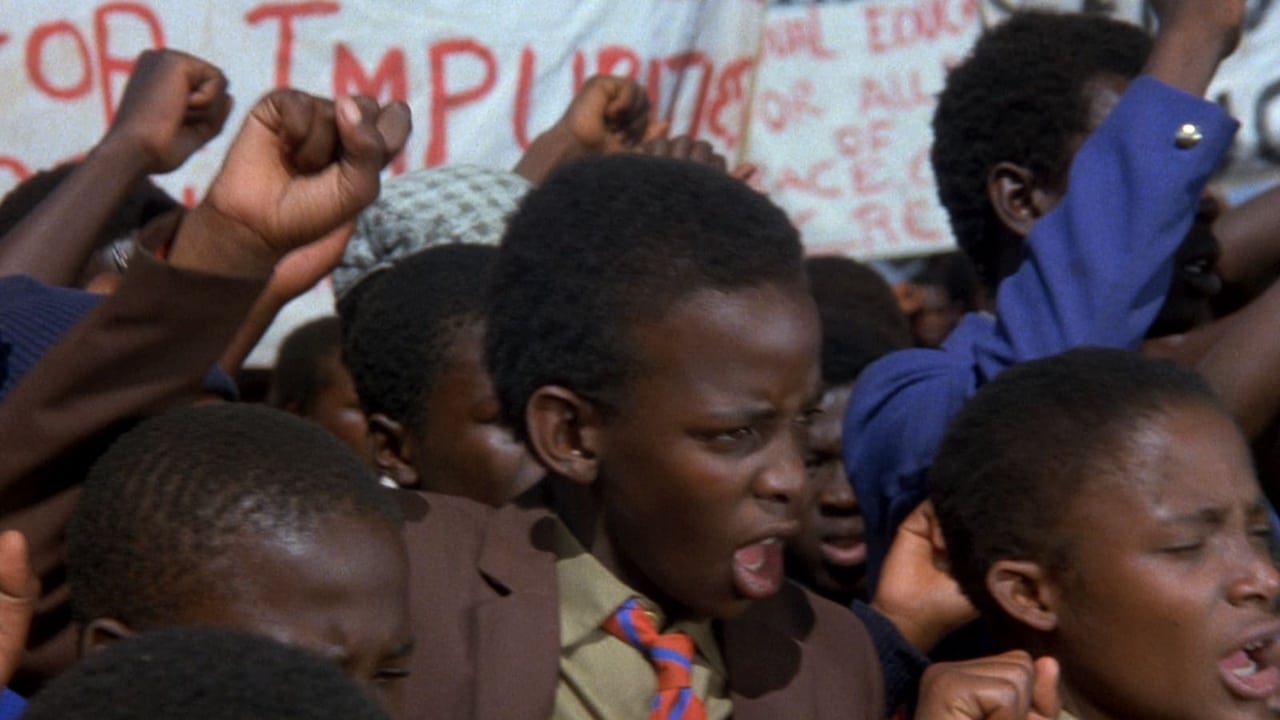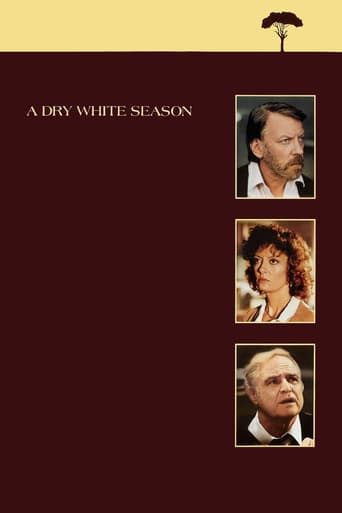

First of all, I want to mention that I lived in South Africa for around 5 years starting in 1975. After that we all left South Africa, for no politically reasons (my parents changed jobs and I left to complete a degree in Europe).I must say that I find the superficial depiction of South Africa (rugby, sunshine and braai vleis like an advert said in those days) realistic. I can't speak about the accents since I viewed this movie in French.Now a series of things struck me as a caricature, excessive or incomplete. Just to name a few in the first 35 minutes...* Pupils at the start complain that learning Afrikaans would be a second-class education (under a new plan, 50% of their education was to be in Afrikaans), they ask for the same education as whites. Well, all white pupils learned Afrikaans and obviously the Afrikaner pupils (whose parents are portrayed as the nasty or naive rulers) had their whole education in Afrikaans. (This is increasingly getting more difficult under the ANC, BTW) In fact, in those pre-globalization days Afrikaans was increasingly more important to get a good job in South Africa (Afrikaans had nearly twice as many mother-tongue speakers than English). There is an inherent contradiction portraying South Africa being run by vicious and powerful Afrikaners and then saying Afrikaans has no importance or that this is what made Bantu Education second rate. (South Africa's public schools today, now teaching far less Afrikaans, are still as dismal...) Hate is what motivated the desire to get rid of Afrikaans. (Hate can be justified. . .)* The start of the shooting is simplified to make a caricature of the whole scene. From the details known, the police faced around 10,000 menacing people who did not disperse after being asked to do so. Neither did they do so when tear gas was shot. The mob killed at least a police dog and then started stoning the police before the police finally shot.* I'm unaware of any very young child (like the little toddling sister) being viciously shot. The movie gives the impression that hundreds were killed during that shooting and its immediate aftermath, in fact 23 were killed among which two whites. Dr Melville Edelstein, who had devoted his life to social welfare among blacks was one of them. He was stoned to death by the mob and left with a sign around his neck proclaiming "Beware Afrikaners". Edelstein was not an Afrikaner.* The whole story of the gardener being tortured because he's looking for his boy and, the movie tells us, having contacted a lawyer really stretches credulity. But I suppose for anyone believing that South Africa was a kind of new Nazi Germany, that's a perfectly normal leap of faith. The security apparatus was cruel and did torture but I very much doubt it tortured parents looking for their children: many parents will have been searching for their children and they were people planning far more nefarious acts... And there lies a problem: André Brink and the movie producer lead us into believing this is a truthful depiction of what happened in Soweto, but I very much suspect it is a just a liberal's impression of what could have happened if a gardener got too inquisitive. * During the history lesson, a pupil recites that the Afrikaners vanquished all the tribes and then settled all over South Africa. (Nasty I tell you!) In fact, the story is far more complex again, a large part of South Africa was emptied by Zulu kings' wars against other tribes (but they are brave and nice) and the Boers encountered very little resistance. This whole episode of Mfecane was taught at school in those days, the pupil would have recited it. The Afrikaners were even granted land by one Zulu king (Dinuzulu) which they helped beat a rival (Zibhebhu). What? Blacks and Whites fought together, as equal allies?* In the taxi, the driver says that Zulu, Xhosa, those differences are not important. He may well say that (ANC activist would have said that to a white), but that is far from the reality in South Africa. In fact as apartheid was falling the biggest massacres occurred between blacks of the Zulu-based Inkatha Freedom Party (IFP) and the ANC. (Any major movie about that anyone?) The IFP wanted a federal South Africa while the ANC wanted a centralized Jacobine State. Today, all South Africans know for example that Zulu (Zuma) was replaced recently by a Venda (Ramaphosa). Tribal identity was and still is very important.* In the same taxi scene, Ben Dutoit clumsily tries to show that he shares some past experiences with the driver: grew on a farm, walked the veld bare feet, etc. The driver then says that at least Dutoit could vote (unlike blacks). The Afrikaner history professor is then dumbstruck. At this stage, he is not an opponent to apartheid and, as such, he would have answered that everyone could vote but each in his homeland. That was the very base of apartheid (Transkei had just been granted its "independence"), he would have known that and believed it. André Brink's portrayal does not sound truthful to someone who lived through those days and experienced unabashed support for the regime from most whites (many English speakers also. . .)* My attention kind of fizzled when Marlon Brando interrogated a witness in court, by now unsurprizingly either very dumb (this doctor's case) or very vicious (his bosses).
... View MoreReleased in the year before the process of ending apartheid began, A DRY WHITE SEASON offers a straightforward portrayal of life, with the Afrikaaners depicted as almost uniformly racist and the black Africans as their largely innocent victims. The only people straddling this racial and ideological divide are history teacher Ben du Toit (Donald Sutherland) and his young son Johan (Rowen Elmes). At the beginning of the film we see du Toit, a former Springbok rugby union player, happily presiding over his learners at his all-white private school. It is only when he learns of the brutal way in which his African gardener Gordon Ngubene (Winston Ntshona) has been murdered by the authorities that his hitherto fixed beliefs in Afrikaaner supremacy are challenged. After an abortive court case charging the police with brutality, du Toit determines to pursue justice at any cost, even at the cost of his family life.The plot is a familiar one with resonances far beyond the immediate South African context. It could prove equally plausible in an historical drama about the anticommunist era in the United States. We roughly know what will happen in the end, but there are some noteworthy moments along the way, especially Marlon Brando's star turn as a campaigning lawyer where he rehearses his British English accent (previously shown off in the remake of MUTINY ON THE BOUNTY (1962).Most of the supporting roles are played by British actors speaking a peculiarly nasal form of Afrikaaner English, including Richard Wilson, Ronald Pickup, Paul Brooke and a youthful Susannah Harker (in a pre- HOUSE OF CARDS role). Perhaps the ruling Afrikaaner oligarchy intervened, but the film would have appeared more historically authentic if more locally employed actors had been cast. Nonetheless the black Africans are all played by locals, who are given the chance to speak Bantu as well as English in the film. Susan Sarandon appears briefly as a British journalist, but she doesn't have to do much.A DRY WHITE SEASON looks a bit anachronistic now, but its sincerity of purpose cannot be doubted.
... View MoreFor many years the government of South Africa carried on it's secret, grizzly business of imprisonment, torture and murder. Hundreds and then thousands of black South Africans were detained, arrested, beaten to death causing the numerous unofficial grave sites to overflow. Until then, many whites of South Africa either ignored their murderous brethren's brutalities or feigned ignorance of the atrocities. "A Dry White Season" rips deeply into the social fabric of both white myths, that proclaimed the enemy consisted of Black terrorists and anarchistic communists and the notion every white Africanier knew what was taking place and turned their heads. One family patriarch, Ben Du Toit (pronouched Toy) Donald Sutherland realizes he and his sanitized life style is to blame when a black Gardner and his son are both arrested and murdered without anyone caring. In order to get the government to change, he must challenge the Police Security Forces, or 'Special Branch' and it's formidable figurehead, Captain Stolz (Jürgen Prochnow, who is convincing as the menace behind the murderers). Marlon Brando is curiously interesting as Ian McKenzie as a sympathetic lawyer. Winston Ntshona is Gordon Ngubene a courageous national unafraid of anything except failure. All in all, a great film which needs to be seen by anyone who cares. ****
... View MoreI believe this to be one of Marlon Brando's most underrated performances. The film itself is a splendid period piece of Apartheid South Africa. I rarely see this movie mentioned in biographical comment with regard to Brando's career, and yet, it is a stunning performance. I assume the lack of comment is the fact that he only played a supporting role, and that the subject of apartheid probably denied it a higher profile. As somebody who has lived in South Africa, both before and after apartheid, i cannot tell you how accurate the performance of Brando is in this role. There is no doubt in my mind that he must have studied meticulously before playing this part. I do not know why, but there are a large percentage of professional people in South Africa who have an almost perfect "Queen's English" accent...but it is tinged with a slight South African edge which only the most perceptive can detect. Not only does Marlon Brando capture this perception, but he somehow manages to replicate it, which i have always found truly incredible. You would have to live South Africa to know how fantastic his voicing is in this part, but believe me, apart from the power of his acting, this role is a truly stunning illustration of his amazing ability. I hope this movie will obtain the higher profile it deserves in the future.Manny Wah Hong Kong
... View More